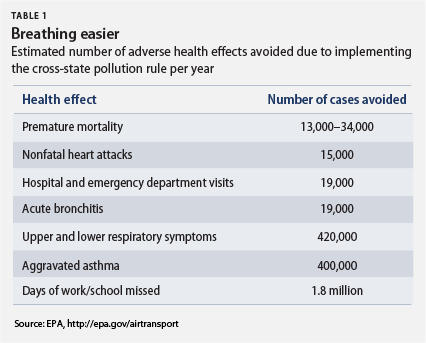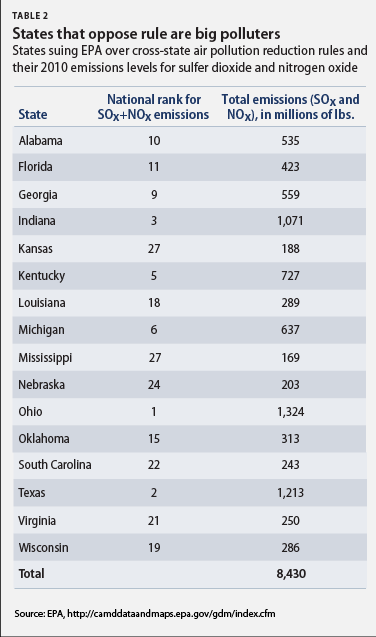By Daniel J. Weiss, Jackie Weidman, Rebecca Leber | February 6, 2012
For full column, click here.
Download a breakdown of coal and utility contributions to state governors and attorneys general (.xls)
Washington, D.C. — Sixteen states and numerous power companies that oppose new pollution-reduction rules must file their petitions today with the U.S. Court of Appeals in D.C, and the Center for American Progress released “Dirty Deeds Done Dirt Cheap: States Sue to Block Smog-Pollution Rules to Help Home State Polluters Avoid Cleanup Costs,” which discuss how these safeguards are needed to protect public health and present coal and utility contributions to state governors and attorneys general. Of the 16 states that sued EPA to block these rules, 7 are among the 10 highest-polluting states in the country, and their governors and attorneys general, who decide whether to file a lawsuit to stop these safeguards, received a combined $5 million in campaign contributions from big utilities and coal companies that benefit from higher-pollution levels.
In response to their initial suit, the court granted a motion to temporarily “stay,” or halt, the implementation of the Cross-State Air Pollution Rule, or smog-pollution rule, which the Environmental Protection Agency, or EPA, promulgated this past summer. These “good neighbor” pollution-reduction standards will require power plants to slash their sulfur dioxide and nitrogen oxide pollution. These substances are the key ingredients in acid rain and smog, and they can travel hundreds of miles and contaminate other states. Once implemented the rule will save thousands of lives and prevent thousands of illnesses annually.

The EPA’s new rules will address a major public-health threat, annually curbing millions of pounds of air pollution from power plants that travel downwind and across the country. An interactive EPA map shows that pollution doesn’t stop at state borders, which is why the agency is acting to reduce air pollution that drifts across state lines. The EPA estimates these rules with produce significant air-quality benefits. By 2014 the rules will reduce sulfur dioxide emissions by 73 percent from 2005 levels. Nitrogen oxide emissions will drop by 54 percent. This improvement in air quality will result in $120 billion to $280 billion in annual benefits, including preventing up to 34,000 premature deaths and avoiding 858,000 other health problems annually that are linked to this pollution, as outlined in the table below.
The stay of the Cross-State Air Pollution Rule will last until at least April 13, when the states’ cases against the rule will be heard, but it could continue much longer. This setback unfortunately hinders vital reductions in air pollution from power plants, prolonging poor air quality for 240 million Americans in 27 eastern states. A long list of plaintiffs sought this timeout on health protection, including 16 states: Alabama, Florida, Georgia, Indiana, Kansas, Kentucky, Louisiana, Michigan, Mississippi, Nebraska, Ohio, Oklahoma, South Carolina, Texas, Virginia, and Wisconsin. Another 12 states affected by the rule are not trying to stop it. It’s no coincidence that the suing states are responsible for more than 90 percent of the nation’s total sulfur dioxide and nitrogen oxide air pollution from power plants, which the law aims to reduce.

Every month of delay in the implementation of the cross-state good neighbor air-pollution rules will allow 2,000 more unnecessary deaths. The judicial stay and lawsuit also prolongs uncertainty about the final rules (login required), which makes it harder and more expensive for power plants to comply with them. The sooner states’ legal challenges to these rules are settled, the sooner power plants can invest in pollution control and clean up the air. States should emerge as leaders in this fight, choosing public health through improved air quality instead of succumbing to the influence from big utility and coal campaign cash. Americans certainly agree.
For full column, click here.
Download a breakdown of coal and utility contributions to state governors and attorneys general (.xls)
To speak with Daniel J. Weiss, please contact Christina DiPasquale at 202.481.8181 or [email protected].
###